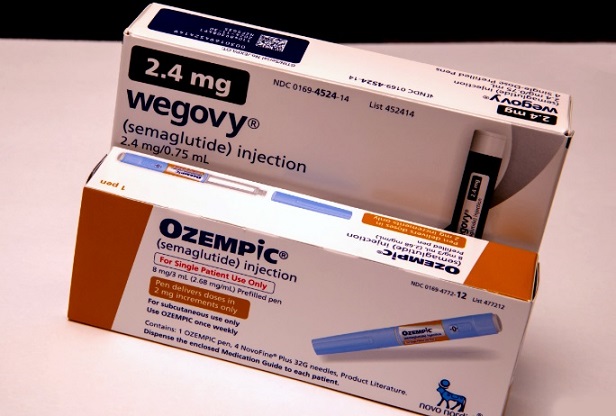Scientists from Washington University Warns of New Risks Discovered with Usage Ozempic and Wegovy
Nikhil Prasad Fact checked by:Thailand Medical News Team Jan 23, 2025 2 months, 3 weeks, 5 days, 6 hours ago
Medical News: Demand for weight-loss medications such as Ozempic and Wegovy continues to rise, capturing public attention as game-changing drugs for managing obesity, diabetes, and related health issues. These medications, categorized as glucagon-like peptide-1 receptor agonists (GLP-1RAs), have gained a reputation as "miracle drugs" for their significant weight-loss effects. However, as their popularity surges, so do concerns about their potential long-term impact on health. In a groundbreaking study, researchers from Washington University School of Medicine in St. Louis and the Veterans Affairs (VA) St. Louis Health Care System uncovered both surprising benefits and notable risks associated with these medications.
 Scientists from Washington University Warns of New Risks Discovered with Usage Ozempic and Wegovy
Scientists from Washington University Warns of New Risks Discovered with Usage Ozempic and Wegovy
The findings, recently published in Nature Medicine, shed light on how these drugs interact with various organ systems, offering a deeper understanding of their effects beyond weight loss. This
Medical News report delves into the details of this study, which evaluated over 2 million individuals and mapped the benefits and risks of GLP-1 medications.
Understanding GLP-1RA Medications
GLP-1 receptor agonists, including popular brands like Ozempic, Wegovy, and others such as Mounjaro and Zepbound, mimic natural hormones that regulate appetite and digestion. These drugs are typically administered via weekly injections and are celebrated for their ability to curb hunger and promote feelings of fullness. When combined with a healthy diet and regular exercise, they can produce remarkable weight-loss results.
The study conducted by Washington University researchers analyzed de-identified medical records from a U.S. Department of Veterans Affairs database. The researchers compared 175 health outcomes among patients taking GLP-1RA drugs for diabetes treatment and those on traditional medications like Jardiance, Glipizide, and Januvia. The dataset encompassed over 2 million veterans treated between October 1, 2017, and December 31, 2023, representing diverse ages, genders, and racial backgrounds.
Key Findings: Benefits to Brain Health and Behavior
The study revealed several significant benefits associated with GLP-1RA drugs. These medications were linked to a reduced risk of neurocognitive disorders, including Alzheimer’s disease and dementia. Additionally, they appeared to lower the likelihood of seizures and substance addiction involving alcohol, cannabis, stimulants, and opioids. Patients also showed a reduced risk of psychological conditions such as suicidal ideation, self-harm, bulimia, and psychotic disorders like schizophrenia.
According to Dr. Ziyad Al-Aly, the study's senior author and a clinical epidemiologist at Washington University School of Medicine, "GLP-1RA drugs act on receptors in brain areas responsible for impulse control, reward, and addiction. This mechanism likely explains their effectiveness in reducing appetite and managing addiction disorders."
/>
The researchers also noted that GLP-1 medications reduce inflammation in the brain, which, coupled with weight loss, may improve overall brain health. "These factors likely contribute to the reduced risks of neurodegenerative conditions such as dementia," added Dr. Al-Aly.
Risks and Adverse Effects: A Double-Edged Sword
While the study highlighted the neurological and behavioral benefits of GLP-1RA drugs, it also brought attention to their risks. Common side effects such as nausea, vomiting, diarrhea, and, in rare cases, gastroparesis (paralysis of the stomach) were well-documented. However, the study identified new potential risks, including adverse effects on the pancreas and kidneys.
Dr. Al-Aly emphasized the seriousness of these findings: "While these risks are relatively uncommon, they can have severe implications. Physicians should be vigilant for signs of pancreatitis and closely monitor kidney function in patients taking these drugs."
Pancreatitis, or inflammation of the pancreas, is a potentially life-threatening condition that requires immediate medical attention. Similarly, kidney problems linked to GLP-1RA drugs may develop silently and progress to advanced stages before becoming symptomatic, limiting treatment options.
Broader Implications for Cardiovascular and Metabolic Health
The study also confirmed previous findings that GLP-1RA medications reduce the risk of cardiovascular events such as heart attacks and strokes. However, the magnitude of these benefits was modest, with reductions ranging from 10% to 20% for most outcomes. Despite the modest effects, Dr. Al-Aly emphasized their importance: "For conditions like dementia, where treatment options are limited, even a modest benefit can be significant."
The research team’s comprehensive approach mapped an "atlas" of health outcomes associated with GLP-1RA use, spanning multiple organ systems. This systematic evaluation provides valuable insights for both clinicians and researchers, highlighting areas for further investigation and potential therapeutic applications.
Balancing Benefits and Risks
Dr. Al-Aly summarized the findings succinctly: "GLP-1RA drugs offer broad health benefits but are not without risks. Their potential to address a wide range of conditions is promising, but careful monitoring and personalized medical care are essential to mitigate adverse effects."
Patients and physicians are advised to weigh the benefits against the risks when considering GLP-1RA medications, particularly for individuals with pre-existing kidney or pancreatic conditions. Lifestyle changes, such as diet and exercise, remain crucial components of any weight-loss or diabetes management plan and should complement the use of these medications.
Study Conclusions
The findings from this extensive study underscore the importance of a balanced perspective when evaluating GLP-1RA medications. While these drugs offer promising benefits for managing weight, addiction, and neurological health, their potential to cause serious side effects cannot be overlooked. Physicians must adopt a cautious approach, closely monitoring patients for signs of adverse effects, particularly those involving the pancreas and kidneys.
The study’s comprehensive atlas of health outcomes provides a valuable resource for clinicians, enabling informed decisions about the use of GLP-1RA drugs. Further research is needed to explore the long-term effects of these medications, particularly as their popularity continues to grow among diverse patient populations.
The study findings were published in the peer-reviewed journal: Nature Medicine.
https://www.nature.com/articles/s41591-024-03412-w
For the latest studies on Ozempic and Wegovy, keep on logging to Thailand
Medical News.
Read Also:
https://www.thailandmedical.news/news/overpriced-designer-semaglutide-weight-loss-drugs-like-ozempic-and-wegovy-can-cause-permanent-blindless
https://www.thailandmedical.news/news/canadian-scientists-alarmingly-find-that-weight-loss-drugs-ozempic-and-wegovy-cause-heart-muscles-to-shrink
https://www.thailandmedical.news/news/new-u-s-fda-warning-for-weight-loss-drugs-ozempic-and-wegovy
https://www.thailandmedical.news/news/weight-loss-drugs-like-wegovy-and-ozempic-can-drive-suicidal-ideation-in-some
